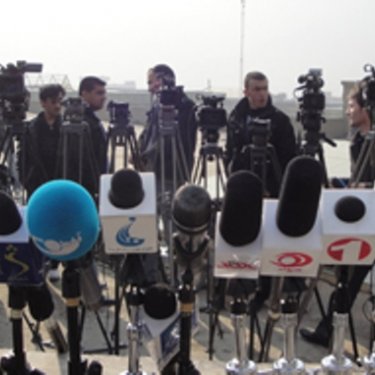RSF urges concrete measures to protect journalists in Afghanistan

After registering at least ten cases of violence against journalists and media outlets in Afghanistan since the start of June, Reporters Without Borders (RSF) reiterates its concern about the dangers to journalists and reminds the Afghan authorities of their duty to protect the media.
The June violence began with the deaths of US photographer David Gilkey and his interpreter, Afghan journalist Zabihullah Tamanna, in a Taliban attack in southern Afghanistan on 5 June .
But it is not just media freedom’s obvious enemies – the Taliban and Islamic State – who are responsible for violence against the media in Afghanistan. The police, intelligence services and local politicians have also contributed to the surge in violence, censorship and self-censorship.
When three almost simultaneous bombings in Kabul on 21 June killed at least 23 people including 14 Nepalese and Indian citizens, journalists who were dispatched to the scene were the targets of aggression by policemen and intelligence officials. Most were insulted and several were beaten, including Ghazi Rasouli, a journalist with Afghanistan’s TV1, Khajeh Tofigh Sedighi of Afghanistan’s TV24 and Shamariz, a cameraman working for an international TV channel.
Kefayatalah Saimi, a journalist with privately-owned Norin TV, was beaten by the bodyguards of the governor of the northern province of Badakhshan on 12 June. He said he was attacked for no apparent reason. One of the governor’s close associates denied that there was any physical violence but accused Saimi of speaking to the bodyguards in an inappropriate manner.
In Jalalabad, the headquarters of Radio Enekas (which means “reflection” in Dari) and Cable TV Networks were bombed on the night of 7 June. Three powerful bombs were used but only two exploded and police defused the third. Journalists at the two media outlets, which are still broadcasting, said the blasts caused a great deal of damage but no injuries. No group claimed responsibility.
There have been armed attacks on media outlets in Jalalabad for the past year. The regional bureaux of the independent Afghan news agency Pajhwok and US government-funded Voice of America were targeted on 12 June 2015. The building that houses Radio Safa, a local station, and the regional office of Radio Killid was targeted by a homemade bomb that destroyed the main door and part of a wall on the night of 10 October 2015.
These attacks were not claimed but there had been threats against several media outlets and journalists by Islamic State, which is present in the region.
Police attacked Radio Kavoon Gar director Mohammad Golab Ibrahimi in Mahtarlam, in the eastern province of Laghman, on 7 June when he tried to cover the distribution of Qatari aid to the local population for the month of Ramadan. Although he showed his press card and explained why he was there, the police roughed him up and broke his camera.
BBC journalist Nemat Kryab was just passing though Jalalabad, in the eastern province of Nangarhar, on 29 may when he was arrested by members of the National Directorate of Security (NDS) and was held for two days. The governor’s spokesman, Atololah Koghani, confirmed that the NDS interrogated him but gave no further details.
RSF also condemns irresponsible comments by politicians such as Amrolah Saleh, a former intelligence chief and current president of the Ravand Sabaz party, who in a Facebook post accused the independent news agency Pajhwok of taking government money and insinuated that it was being manipulated by the intelligence services.
In a country where the Taliban and other armed groups are quick to kill journalists suspected of being government supporters, such an accusation is utterly irresponsible. Criticism of the media should of course be permitted and it can encourage them in their work and adherence to journalistic ethics. State subsidies for media outlets can also be criticized but, as many democracies show, subsidies in themselves are not evidence of manipulation. In such a critical situation as Afghanistan’s, the priority should be journalists’ safety.
“These criminal attacks on the media are indicative of a desire on the part of media freedom’s various predators to impose a climate of terror in Afghanistan,” said Réza Moïni, the head of RSF’s Iran-Afghanistan’s desk.
“Such violence endangers the right of journalists to inform the Afghan people. The police and security services have a duty to protect journalists and media outlets. We call on President Mohammad Ashraf Ghani, Chief Executive Abdullah Abdullah and the information and culture minister to take concrete measures to end this violence, including the police violence.”
L’Afghanistan est classé 120éme sur 180 dans le Classement mondial de la liberté de la presse 2016 établi par Reporters sans frontières.



